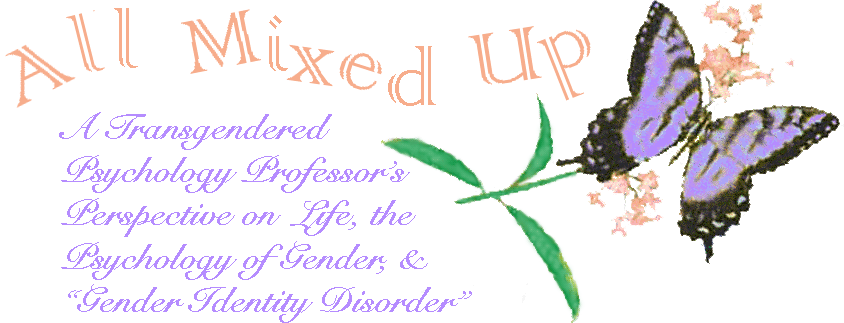
|
|

|
Read excerpts from Pat Califia's Sex Changes: Politics of Transgenderism on Janice Raymond's Transsexual Empire.
Pat Califia is the author of "Sex Changes: the Politics of Transgenderism." I feel it's one of the best books ever written about transsexualism by a non-transsexual. The following excerpt if from page 113. UPDATE!!!!! Since I prepared this page Patrick came out as a transsexual so I guess this is no longer the best book about a transsexual by a non-transsexual. :-) But it's still an incredible book. What's probably most fascinating about reading this book is how much you get to learn about a transsexual's life before he figured everything out. And, like most transsexuals, he didn't just figure everythign out instantly. In many ways he's one of the public transsexuals I identify most with. What's weird is this is now the second feminist essay I put on my site by somebody who admits previously being transphobic who now recognizes his/her trans- nature. Keep reading this site for the latest news to find if (when) Janice Raymond transitions to James Raymond!!!! :-)
Ironically, my own history contains a period of transphobia as deep as Raymond's or Millot's. When I came to San Francisco in the mid-seventies, I was a separtist. I came out when I was underage, and practically the only dykes who would talk to me were a handful of women who were lesbian-feminist separatists. The rest of the town's dyke community regarded them as crazy bra-burners, by the way, and me as jailbait. I had absorbed this separatist philosophy because it made sense to me. I loved women, and men tried to prevent me from doing that. Most of the time when I got harassed, it was by straight men. I hated them for that, and didn't want to be around them. I wanted to be with women.
As I tried to locate myself in San Francisco's much larger and more sophisticated lesbian community, I heard the Daughters of Bilitis (DOB) had recently purged a male-to-female transsexual who had been an officer in their organization. This event was still a hot topic, and one of the ways I made friends with other dykes was to express my approval of the purge. It made me really angry and unhappy to encounter opposition from a women I respected, a former bar dyke and diesel butch who liked what she heard about the women's movement and became a feminist. She had actually been present at the stormy meeting where this women was ousted, unlike most of the rest of us who were talking about it, and she had not liked what she saw.
"This doesn't feel okay to me," she said. "She worked harder than anybody else in DOB. She gave a lot to that organization. There was no good reason to kick her out. She hadn't done anything wrong except be a transsexual. You wouldn't believe some of the vile and vicious things other women said to her. And she just sat and listened to all of it, kept her dignity, and answered them back without losing her temper or calling anybody names."
I didn't know what to think about that. Who cared what happened to some man? Who cared if we hurt his feelings? Men had hurt my feelings and much worse than that hundreds of times. By kicking out this impostor, I felt we were simply giving the patriarchy back a little of its own shit. But here was a women I respected, a dyke with good political credentials, older and wiser than me, who was telling me that this was wrong. She called it a witch hunt. She was brave enought to disagree with me. It didn't change my mind, but I carried this uncomfortable confrontation away with me and thought about it over the course of the next year. I stopped running my mouth about this debate and just llistened.
What I heard made me uneasy. I didn't have a lot of leftist political education but I knew about McCarthyism. I knew that during the fifities this country had been througuh massive witch-hunts to ferret out queers and Communists. That infamous question, "Have you now or have you ever been ..." rang in my ears. And what I saw happening began to feel like a witch-hunt. It reminded me of all the creeps in school banding together on the playground to beat up a new kid who had not yet acquired allies or protectors.
|
|
|